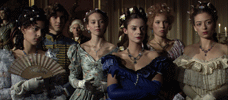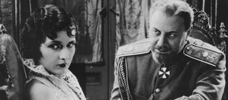Reviews
Josef von Sternberg
USA, 1928
Credits
Review by Cullen Gallagher
Posted on 01 October 2008
Source Paramount 35mm print
Categories The 46th New York Film Festival
The Last Command stands on the precipice of two auteurs. On the one hand, it is distinctly the vision of director Josef von Sternberg, with his overly romantic sense of narrative expression, which privileges style above all else. At the same time, the film is undeniably under the influence of its star, Emil Jannings. Following the international success of F.W. Murnau’s The Last Laugh in 1924 (in which Jannings plays an aging hotel doorman who is stripped of his regal uniform and demoted to bathroom attendant) Jannings’ roles, both in Germany and subsequently in Hollywood, would bear the imprint of that landmark movie. He came to represent a dying breed, the final remnant of classical German respectability that had been disappearing since the country’s loss in World War I and the ensuing economic depression. But this rapid modernization (socially, politically, and artistically) was not limited just to Germany: as Jannings’ variety of roles show, Russia and the United States were also deeply enmeshed in cultural metamorphosis. Change was blooming and so was Jannings’ career—his characters, however, were most certainly wilting.
Janning’s character in The Last Command, General Sergius Alexander, continues the archetype of the fallen man. The film begins with Alexander as a frail old man living in Hollywood, scared to even open his door, with a nervous tic that causes his head to spasm incessantly. When he is cast as an extra in a movie directed by Lev Andreyev (William Powell), Alexander begins to suffer flashbacks to his former life in Russia before the Revolution, where his high rank in the military and close relationship to the Czar granted him great privilege.
Andreyev, it turns out, was a feared revolutionary whom Alexander had sent to prison. Natalie Dabrova (Evelyn Brent), Andreyev’s girlfriend and political cohort, was spared a prison sentence by agreeing to become romantically involved with Alexander. Her political allegiances became murky, however, when she began to fall in love with him. And once the Revolution occurred, Dabrova was forced to negotiate her two faces in order to not only save herself, but Alexander as well. Having escaped once already, Alexander must re-enact a battle against the Revolutionaries back in Hollywood, but this proves too much for him: hallucinating that he is on the battlefield for real, Jannings makes his “last command” in order to preserve a way of life that he firmly believes in. His ultimate performance caught on camera, he then collapses, regaining (at least for himself) his lost nobility with his last breath.
For Murnau, Jannings’ loss of dignity is an internal dilemma, whereas for von Sternberg it is primarily an external drama. In The Last Laugh, the doorman’s anxieties manifest themselves in his environment: through trick photography, buildings seem to come alive and chase him down the street—the weight of the world, literally, crushing him. However, in The Last Command, Alexander constantly receives bodily abuse. In Hollywood, the costume line pushes and shoves him around, while in the makeup room his fellow actors toy about with his personal medal, mocking the last pieces of his dignity. And in Russia, the entire violence of the Revolution is invested into Alexander’s ritualized physical humiliation in which he is not only spit upon and thrashed, but also made to perform “labor” by shoveling coal into the train’s engine. This, for the Revolutionaries, is the ultimate indignity: a literal juxtaposition of status in which Alexander’s clothes are given to those in lower classes, while he performs their former jobs.
Von Sternberg’s visual extravagance predominates the film: lavish period décor, grandiose staging, and narrative excess (particularly towards the end, scenes are milked for their drama and style, not for their coherence, logic, or plausibility). Certain elements of the script are quite problematic (a train wreck that comes out of nowhere, and unwarranted sentiment from Andreyev in the film’s final scene), and their irregularity is clearly evident. John Baxter, in his monograph The Cinema of Josef von Sternberg, suggests that several scenes were removed from the last half of the film that altered the motivations - and obscured the clarity - of the remaining scenes. Such stories are not unheard of in the days of the Hollywood Studio System and, with several writers credited on the film, it’s difficult, if not impossible to pin down who is responsible for what.
To emphasize that The Last Command is a visual film is not to excuse its troubled script, but to draw attention to its wealth of merit rather than dwell on its flaws. As the femme fatale, Evelyn Brent is a vision of seductive duplicity and, under the glow of von Sternberg’s careful lighting, prefigures the dangerous sexual beast that is Dietrich. There’s little opportunity for Powell to be more than a mustached prop, and his storyline especially suffers from being under-written and incomplete. (Neither Andreyev’s nor Alexander’s journey from Russia to Hollywood is explained.) But, above all else, this is Emil Jannings’ movie, for which he was awarded the first ever Academy Award for Best Actor (a combined win for his performances in both Command and The Way of All Flesh). While his work in The Last Laugh and The Blue Angel (another collaboration with von Sternberg) is arguably better, his performance in The Last Command is still incredibly affecting eighty years later, and it is to his credit that he is able to tap into some universal strain that makes his character relatable and sympathetic under many disparate circumstances.
More The 46th New York Film Festival
-

Wendy and Lucy
2008 -

The Northern Land
2008 -

The Last Command
1928 -

Hunger
2008 -

Lola Montès
1955 -

Summer Hours
2008 -

Gomorrah
2008 -

Changeling
2008 -

Che
2008 -

I’m Gonna Explode
2008 -

Waltz with Bashir
2008 -

Happy-Go-Lucky
2008 -

The Windmill Movie
2008 -

Tulpan
2008 -

Afterschool
2008 -

A Christmas Tale
2008 -

The Headless Woman
2008 -

Bullet in the Head
2008 -

Four Nights with Anna
2008 -

Night and Day
2008 -

The Class
2008
We don’t do comments anymore, but you may contact us here or find us on Twitter or Facebook.



